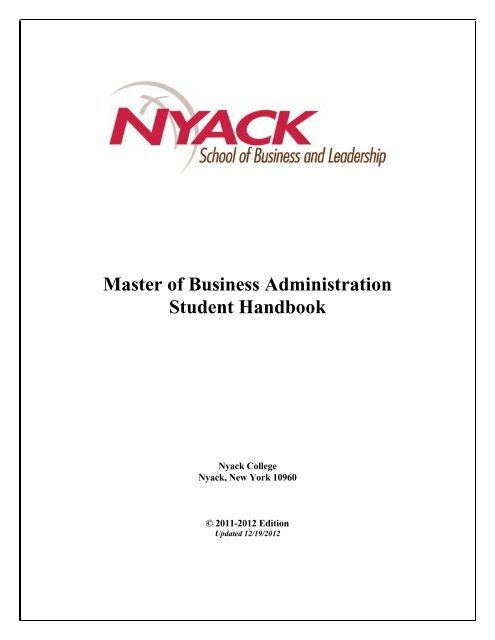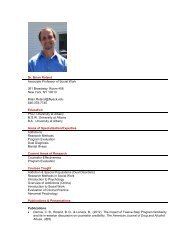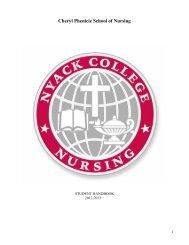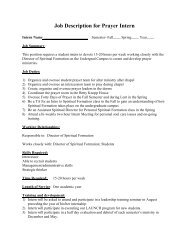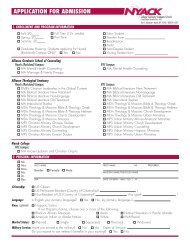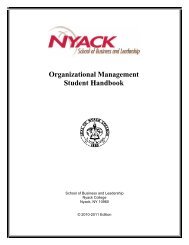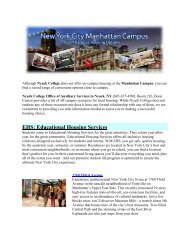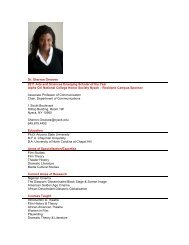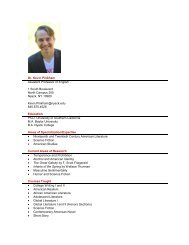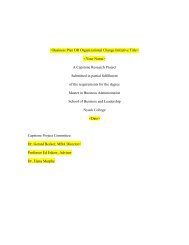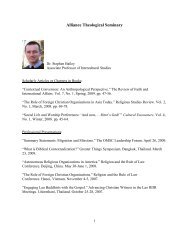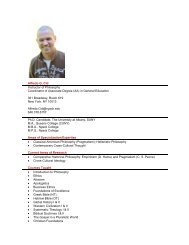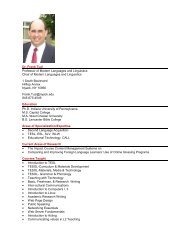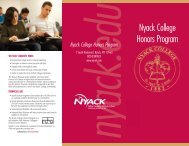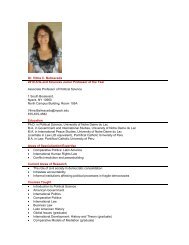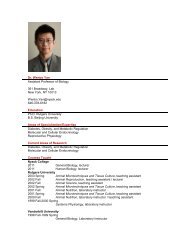Master Of Business Administration Student Handbook - Nyack College
Master Of Business Administration Student Handbook - Nyack College
Master Of Business Administration Student Handbook - Nyack College
You also want an ePaper? Increase the reach of your titles
YUMPU automatically turns print PDFs into web optimized ePapers that Google loves.
<strong>Master</strong> of <strong>Business</strong> <strong>Administration</strong><br />
<strong>Student</strong> <strong>Handbook</strong><br />
<strong>Nyack</strong> <strong>College</strong><br />
<strong>Nyack</strong>, New York 10960<br />
© 2011-2012 Edition<br />
Updated 12/19/2012
<strong>Nyack</strong> <strong>College</strong> reserves the right to change any policy or academic requirements, tuition, or fees.<br />
<strong>Nyack</strong> <strong>College</strong> admits students of any race, color, sex, age, or national and ethnic origin to all<br />
rights, privileges, programs, and activities generally accorded or made available to students at the<br />
college. Programs are operated in compliance with Title IX of the Education Amendments of 1972,<br />
Section 504 of the Rehabilitation Act of 1973, Title VI of the Civil Rights Act of 1964, and all<br />
other relevant statutes and regulations.<br />
<strong>Nyack</strong> <strong>College</strong> is accredited by The Middle States Association of <strong>College</strong>s and Secondary Schools<br />
and is licensed by the Educational Licensure Commission of D.C. The <strong>Master</strong> of <strong>Business</strong><br />
<strong>Administration</strong> is a registered program that is offered in compliance with the regulations of the<br />
Department of Education of the State of New York.<br />
The MBA <strong>Handbook</strong> is not meant to be exhaustive. To write an exhaustive listing of policies and<br />
procedures would mean rewriting the Institutional Catalog. The purpose of the handbook is to<br />
highlight the policies and procedures that most affect the MBA student throughout the program. It<br />
is to the student’s advantage to be familiar with both the Institutional Catalog and the MBA<br />
<strong>Handbook</strong>.<br />
A copy of the <strong>Handbook</strong> is posted on the <strong>Nyack</strong> <strong>College</strong> MBA website under CURRENT<br />
STUDENT INFORMATION.<br />
http://www.nyackcollege.edu/mba<br />
2
NYACK COLLEGE CORE VALUES<br />
Socially Relevant<br />
1a. <strong>Student</strong>s will recognize the value of economic, political, social, and organizational<br />
systems as tools for positive change.<br />
1b. <strong>Student</strong>s will apply a foundation of compassion and integrity to their chosen field of<br />
study.<br />
1c. <strong>Student</strong>s will demonstrate servant leadership as they engage the community and<br />
marketplace.<br />
Academically Excellent<br />
2a. <strong>Student</strong>s will attain an educational foundation in arts and humanities, science,<br />
mathematics, and social science.<br />
2b. <strong>Student</strong>s will be able to communicate in oral and written form and demonstrate<br />
information and technological literacy.<br />
2c. <strong>Student</strong>s will demonstrate critical thinking, problem solving, and research skills across<br />
the curriculum.<br />
Globally Engaged<br />
3a. <strong>Student</strong>s will understand the interplay of historical, cultural, and geographical realities of<br />
the global community.<br />
3b. <strong>Student</strong>s will value diversity through an understanding of worldviews, languages,<br />
cultures, and peoples.<br />
3c. <strong>Student</strong>s will engage in service opportunities within the global community.<br />
Intentionally Diverse<br />
4a. <strong>Student</strong>s will understand the heritages and traditions of diverse peoples and cultures.<br />
4b. <strong>Student</strong>s will appreciate the need to promote biblical principles of social<br />
equality.<br />
4c. <strong>Student</strong>s will engage in interactions and relationships with those from diverse<br />
backgrounds.<br />
Emphasizing Personal Transformation<br />
5a. <strong>Student</strong>s will grow in their faith as they pursue God’s purpose in their lives.<br />
5b. <strong>Student</strong>s will integrate their Christian worldview into learning and service.<br />
5c. <strong>Student</strong>s will apply discipleship principles to assist in the personal<br />
transformation of others.<br />
3
<strong>Student</strong> <strong>Handbook</strong><br />
<strong>Master</strong> of <strong>Business</strong> <strong>Administration</strong><br />
TABLE OF CONTENTS<br />
I. STAFF CONTACT INFORMATION<br />
MBA Staff ..............................................................................................................................6<br />
MBA Support Staff ................................................................................................................6<br />
SBL Staff................................................................................................................................6<br />
MBA Questions/Concerns/Grievances Protocol ....................................................................7<br />
Holiday <strong>Of</strong>fice Closings .........................................................................................................7<br />
II.<br />
III.<br />
IV.<br />
INTRODUCTION TO THE MASTER OF BUSINESS ADMINISTRATON<br />
Overview ................................................................................................................................8<br />
Faculty Profile ........................................................................................................................9<br />
STATEMENT OF PROGRAM<br />
Mission Statement ..................................................................................................................20<br />
MBA Program Goals .............................................................................................................20<br />
MBA Oath ..............................................................................................................................213<br />
CURRICULUM<br />
Course Layout ........................................................................................................................22<br />
Course Descriptions ...............................................................................................................23<br />
Entrepreneurial Capstone Project Information.......................................................................28<br />
V. POLICIES<br />
Satisfactory Academic Progress (SAP) ..................................................................................29<br />
Grade Point System ................................................................................................................29<br />
Class Attendance ....................................................................................................................29<br />
Professor Evaluations .............................................................................................................30<br />
Residency Requirement .........................................................................................................30<br />
Concentrations .......................................................................................................................30<br />
Entrepreneurial Seminar Series ..............................................................................................30<br />
Graduation ..............................................................................................................................30<br />
Certification ...........................................................................................................................31<br />
Communication ......................................................................................................................31<br />
VI.<br />
SUPPORT SERVICES<br />
<strong>Nyack</strong> <strong>College</strong> Website ..........................................................................................................32<br />
Login/Password Information ..................................................................................................32<br />
<strong>Student</strong> ID’s ...........................................................................................................................33<br />
4
VII.<br />
LIBRARY<br />
<strong>Nyack</strong> <strong>College</strong>/ATS Libraries ................................................................................................34<br />
Library Hours .........................................................................................................................34<br />
Phone Numbers for Area Libraries ........................................................................................35<br />
Holdings .................................................................................................................................35<br />
Services ..................................................................................................................................36<br />
Overdue and Replacement Fees .............................................................................................37<br />
VIII. eCOLLEGE ONLINE COURSE WEBSITE<br />
Instructions for Using e<strong>College</strong> .............................................................................................38<br />
5
I. CONTACT INFORMATION<br />
MBA STAFF<br />
361 Broadway, 5 th Floor<br />
New York, NY 10013<br />
Dr. Gerard Becker<br />
MBA Director<br />
(646) 378-6178<br />
Gerard.Becker@nyack.edu<br />
Mrs. Michele Ortiz<br />
MBA Program Manager<br />
(646) 378-6100, ext. 7716<br />
Michele.Ortiz@nyack.edu<br />
MBA SUPPORT STAFF<br />
Mr. Joseph Lee<br />
Assistant Graduate Registrar<br />
(845) 770-5769<br />
Joseph.Lee@nyack.edu<br />
Ms. Loida Yela<br />
Director of Graduate Financial Services<br />
(646) 378-6124<br />
loida.yela@nyack.edu<br />
Ms. Giselle Torres<br />
e<strong>College</strong> Online Course Website Coordinator<br />
www.nyackonline.org<br />
Giselle.Torres@nyack.edu<br />
SBL STAFF<br />
Sky Island Lodge<br />
1 South Boulevard<br />
<strong>Nyack</strong>, NY 10960<br />
Dr. Anita Underwood<br />
Dean, School of <strong>Business</strong> and Leadership<br />
(845) 675-4476<br />
Anita.Underwood@nyack.edu<br />
6
Ms. Giselle Torres<br />
Assistant to Dean, School of <strong>Business</strong> and Leadership<br />
(845) 675-4481<br />
Giselle.Torres@nyack.edu<br />
MBA QUESTIONS/CONCERNS/GREIVANCES PROTOCOL<br />
For any questions, concerns or grievances please adhere to the following protocol. Failure<br />
to do so will slow the response time:<br />
1. Mrs. Michele Ortiz<br />
MBA Program Manager<br />
2. Dr. Gerard Becker<br />
MBA Director<br />
3. Ms. Giselle Torres<br />
Assistant to Dean, School of <strong>Business</strong> and Leadership<br />
4. Dr. Anita Underwood<br />
Dean, School of <strong>Business</strong> and Leadership<br />
HOLIDAY OFFICE CLOSINGS<br />
Martin Luther King Day<br />
Good Friday<br />
Memorial Day<br />
Independence Day<br />
Labor Day<br />
Thanksgiving Break (Wednesday/Thursday/Friday before)<br />
Christmas/New Years Break (varies yearly)<br />
7
II.<br />
INTRODUCTION TO THE MASTER OF BUSINESS<br />
ADMINISTRATON<br />
OVERVIEW<br />
<strong>Nyack</strong>’s MBA program is designed specifically for students who wish to work full time<br />
while earning their degree. By choosing <strong>Nyack</strong> <strong>College</strong> MBA program students benefit<br />
from:<br />
Rigorous Curriculum<br />
Course work prepares students for the workplace with real-world business challenges,<br />
taught by faculty with superior academic credentials and a strong background in business.<br />
Convenient Locations<br />
The MBA program offers locations in Manhattan, <strong>Nyack</strong> and Online (beginning the fall<br />
of 2012).<br />
Flexibility<br />
The MBA program allows you to complete your MBA coursework in as little as 16<br />
months, with classes held in Manhattan two weekday evenings, <strong>Nyack</strong> on Saturdays, or<br />
Online (beginning the fall of 2012).<br />
.<br />
Personal Attention<br />
With an average cohort size of 15 students, the MBA program ensures you receive the<br />
personal, hands-on attention you deserve.<br />
Community<br />
The MBA is delivered in a small cohort format providing an outstanding community<br />
experience for each student. You will develop deep relationships as you work together in<br />
teams, assist each other in completing assignments, and graduate together at the end of<br />
the program.<br />
8
FACULTY PROFILE<br />
Gerard Becker, MBA Director<br />
Credentials:<br />
Ph.D., Organization and Management, Capella University<br />
MBA, Management/Finance, Adelphi University<br />
BBA, Management/Finance, Adelphi University<br />
Background: Served as a Management consultant in the financial services, information<br />
technology and manufacturing businesses; an educator, senior business leader, and lifelong<br />
learner. Co-author of a book on management consulting, has published in many<br />
scholarly peer-reviewed journals on topics ranging from entrepreneurship,<br />
transformational leadership, organizational culture and climate through systematic<br />
thinking.<br />
Robert Bohn, Full-Time Undergraduate <strong>Business</strong> Professor<br />
Credentials:<br />
MBA, Marketing, Management Science, St John’s University<br />
B.S., Marketing, Communications, Manhattan <strong>College</strong><br />
Background: Professor, Marketing, Brand Management & <strong>Business</strong> <strong>Administration</strong><br />
Director, Marketing Development, Creative Services and Brand Management. Director<br />
of Marketing at a diverse group of well-established organizations including The<br />
Leukemia & Lymphoma Society (LLS), Metro International, People Magazine, Forbes<br />
Magazine, PRIMEDIA, ESPN and Kiplinger's Personal Finance. Is a full time evening<br />
educator with New York University’s Professional Studies Program, Stern Graduate<br />
School of <strong>Business</strong>, NYU SCPS (School of Continuing and Professional Studies); NYU<br />
<strong>Master</strong>s of Direct Marketing; and NYU / Paul McGhee Undergraduate Division for<br />
Adults. Taught and currently teaching hybrid and in-class courses at Baruch <strong>College</strong>;<br />
9
Fashion Institute of Technology, Fordham University; Manhattanville <strong>College</strong>, LIM<br />
<strong>College</strong>; Metropolitan <strong>College</strong> of New York, <strong>College</strong> of Westchester, Manhattan <strong>College</strong>;<br />
The Mountbatten Institute; and the European School of Economics. Awarded The<br />
General Excellence Award for Teaching and NYU’s Torch Pin twice (awarded to long<br />
standing professors who have exhibited continued excellence in academic behavior).<br />
Gordon Boronow, Assistant Professor of <strong>Business</strong><br />
Credentials:<br />
Ph.D., Economics, State University of New York Stony Brook<br />
M.A., Economics, State University of New York Stony Brook<br />
B.S., Mathematics, Lafayette <strong>College</strong><br />
Background: Assistant Professor in the School of <strong>Business</strong> and Leadership at <strong>Nyack</strong><br />
<strong>College</strong>, with primary teaching responsibilities in economics and finance. Research<br />
interests are in macroeconomics, social insurance, and behavioral economics. Prior to<br />
academic career, worked in the financial services industry and became a Fellow of the<br />
Society of Actuaries in 1980. Actuarial career included stints at Equitable Life, New<br />
York City, Tillinghast, New York City, Connecticut Mutual Life, Hartford, CT and<br />
American Skandia Life Assurance Corp., Shelton, CT. Was a pioneer in both variable<br />
and universal life insurance policy design, and inventor of a patented actuarial mechanism<br />
to incorporate investment performance in the design of an immediate variable annuity. In<br />
1991, was named President and COO of American Skandia Life, serving until 2001.<br />
During tenure, American Skandia Life became the leading variable annuity provider to<br />
the independent broker-dealer market and assets under his management increased from<br />
$100 million to over $40 billion. In 2001, after retirement, chose to pursue an academic<br />
career.<br />
10
Douglas Coffey, Adjunct Professor<br />
Credentials:<br />
MBA, Finance, St John’s University<br />
B.A., Psychology, Queens <strong>College</strong><br />
Background: Worked the last fourteen years at the Federal Reserve Bank of New York,<br />
developing an appreciation of the role of central banks in setting and implementing<br />
monetary policy. After a long and satisfying career in banking as a training manager,<br />
turned focus to teaching accounting and finance at several universities, and most recently<br />
teaching International Accounting at <strong>Nyack</strong> <strong>College</strong>. Experience in Sarbanes-Oxley<br />
compliance reporting, budgeting, and project management ties in well with teaching<br />
accounting and finance courses.<br />
Cynthia Dorsey, Adjunct Professor<br />
Credentials:<br />
MBA, General Management, <strong>Nyack</strong> <strong>College</strong><br />
B.S., Organizational Management, <strong>Nyack</strong> <strong>College</strong><br />
Background: Currently serves as Assistant to the Pastor and the Minister of Christian<br />
Education at Union Baptist Church in New Rochelle, New York. As the Minister of<br />
Christian Education, has been instrumental in growing the teaching and training ministry<br />
of the church, and received numerous awards for outstanding commitment and faithful<br />
service, including Woman of the Year honor. Assisted with the Pastoral Care and also<br />
managed membership growth and retention at the Abyssinian Baptist Church in Harlem,<br />
New York. Currently serves as a primary instructor for the OM program and adjunct<br />
professor/thesis and capstone project advisor for the MSOL and MBA graduate programs<br />
at <strong>Nyack</strong> <strong>College</strong>. Also serves as a liaison and teacher of incarcerated men at the Fishkill<br />
Correctional Facility in New York.<br />
11
Ed Eskew, Adjunct Professor<br />
No Photo Available<br />
Credentials:<br />
MBA, Finance, <strong>Nyack</strong> <strong>College</strong><br />
B. S., Organizational Management, <strong>Nyack</strong> <strong>College</strong><br />
A.A.S., Information Technology<br />
Background: Managing Partner, Chief Information <strong>Of</strong>ficer at CGAtlantic Inc. Thirty-six<br />
years of experience in the information technology field, working with New York area<br />
based companies such as Bernard Chaus Inc., Chanel Inc., Swiss Bank Corporation,<br />
Burroughs Corporation, and Garan Inc. Presently works closely with clients to provide<br />
sustainable, cost effective technology solutions throughout client’s enterprise. Assessing,<br />
and re-engineering decade old processes, yielding significant commercial value and has<br />
become the corner stone of today’s demand to work smarter, faster, and better in this<br />
challenging financial landscape.<br />
Anne Hallcom, Adjunct Professor<br />
Credentials:<br />
Ph.D., Organization and Management, Capella University<br />
MBA, University of LaVerne<br />
B.S., Iowa State University<br />
Background: Experience in healthcare and management. Career began as a licensed<br />
Medical Technologist working in private and hospital laboratories serving in a managerial<br />
capacity. Transitioning to the healthcare manufacturing arena, has held senior leadership<br />
roles in Program Management, Quality, Regulatory, and Marketing functions for a<br />
Fortune 500 corporation. Dissertation focus was transformative learning in mature<br />
organizations, studying and describing what it takes to transform an organizational<br />
culture to one that values learning and enables individuals and groups to reach their full<br />
potential.<br />
12
Kathryn Leary, Adjunct Professor<br />
Credentials:<br />
MBA, Marketing, Stanford University<br />
B.A., <strong>Administration</strong>, Communication Antioch <strong>College</strong><br />
Background: Is a marketing consultant, writer and Adjunct Professor at <strong>Nyack</strong> <strong>College</strong>.<br />
Over the past 35 years, has excelled in the fields of advertising, marketing,<br />
communications, public relations, entrepreneurship and education. Career began on<br />
Madison Avenue working for ad agencies including Young & Rubicam, BBD&O and<br />
Ted Bates, rising to Vice President. Served as President and CEO of Jamison & Leary<br />
Advertising, a Saatchi & Saatchi affiliate, which became the subject of a 1990 case study<br />
at Stanford <strong>Business</strong> School under the leadership of then lecturer Jim Collins, author of<br />
bestsellers Built to Last and Good to Great. Team-taught the case at Stanford with<br />
Collins for three years and later established The Leary Group, a global marketing<br />
company. As strategic market entry specialists, the firm successfully guided numerous<br />
companies into the markets of Japan and South Africa, ranging from Estee Lauder to Ben<br />
& Jerry's Homemade Ice Cream, to small minority and women-owned businesses. A<br />
consultant, trainer and lecturer for firms including AT&T, Lucent Technologies, Hewlett<br />
Packard, and Corning Inc., motivating executives to expand their potential as global<br />
managers.<br />
John Mahoney, Adjunct Professor<br />
Credentials:<br />
BBA, Baruch, CCNY, CUNY<br />
MBA, University of Phoenix<br />
CPA, New York State License<br />
Background: Originally worked for various accounting firms over a ten year period<br />
doing audits, reviews, and compilations as well as preparing various tax returns. Over the<br />
next ten years worked as a Controller and Vice President of Finance for a few companies<br />
and was significantly involved in Mergers & Acquisitions for some of these companies.<br />
13
In the summer of 1991, began a CPA Practice and taught various accounting and finance<br />
courses at NYU and Baruch. Appeared on “Good Day New York” (Fox Channel 5) in<br />
January 1999 and also appeared in various magazines and in an article on page one in the<br />
Wall Street Journal (03/02). January 2003, helped Chinese students in China prepare for<br />
the US Chartered Financial Analyst (CFA) exam. In 2008, published the book, Real<br />
Estate Accounting & Taxation.<br />
Clarence Mc<strong>Master</strong>, Adjunct Professor<br />
Credentials:<br />
LLM/Taxation, Washington <strong>College</strong> of Law<br />
CFP/Financial Planning, <strong>College</strong> of Financial Planning<br />
JD/Law, Loyola Law School<br />
MBA, Pepperdine University<br />
B.A., Finance, Adelphi University<br />
Background: An officer at MetLife Company, serving as an Executive–on–Loan from<br />
MetLife to the National Academy of Science division of the National Research Council in<br />
Washington, D.C. Is currently an active member of the California Bar, and is licensed to<br />
practice before the federal bar, central district, and the ninth circuit court of the appeals.<br />
Is a certified financial planner with the financial planning board of standards, and editor<br />
of the Health Care and other Non-profit employee tax handbook, author of the United<br />
Resources Retirement <strong>Handbook</strong>, and the United Resources Budget <strong>Handbook</strong>, and editor<br />
and co-author of the Personal Financial Planning <strong>Handbook</strong>. Does volunteer work at<br />
SCORE, a nonprofit partner with the SBA providing advice and counsel to entrepreneurs<br />
and small business owners.<br />
14
James Muckell, Associate Professor of Accounting<br />
Credentials:<br />
CPA, New York and New Jersey License<br />
MBA, Management, Pace University<br />
B.S., Accounting, Fordham University<br />
Background: Corporate experience including six years as Controller, nine years in<br />
Internal Audit and a stint in Mergers and Acquisitions. After twenty years began a fulltime<br />
practice and has specialized in assisting small businesses grow by automating and<br />
improving their reporting function, streamlining operations, strengthening internal control<br />
systems and obtaining the capital necessary for growth. Serves clients in the following<br />
industries: food supplements, franchising, manufacturing, trucking, insurance, publishing,<br />
dry cleaning and construction, and has developed a sizable not-for–profit clientele.<br />
Serves a large number of individual clients by providing them with the tax planning and<br />
preparation services, as well as providing investment advisement, retirement planning,<br />
college planning, estate planning and life insurance services for my tax and accounting<br />
clients and individuals and businesses that are referred. Is currently head of the <strong>Nyack</strong><br />
<strong>College</strong> accounting program, teaching accounting, taxation and finance.<br />
Richard Ponschock, Adjunct Professor<br />
Credentials:<br />
Ph.D., Organization and Management, with an Information Technology Specialty,<br />
Capella University<br />
MBA, Information Technology, Keller Graduate School of Management<br />
B.S., Information Systems, National <strong>College</strong><br />
Background: Currently the General Manager of a third party Logistics Company.<br />
Career focuses on the alignment and application of technology to achieve strategic<br />
organizational initiatives and growth. Is an educator, presenter at industry and academic<br />
15
conferences, including the Academy of Management and the International Academy of<br />
<strong>Business</strong> and Economics. Has written papers on technology architecture, applied<br />
technology, and the future impact of today’s virtualization and social networks on future<br />
generations.<br />
Stephanie Quarles, Adjunct Professor<br />
Credentials:<br />
MBA, Management/Finance, University of Bridgeport<br />
B.S., <strong>Business</strong> <strong>Administration</strong>, Concordia <strong>College</strong><br />
Background: Currently the Marketing Operations Manager at IBM. Twenty-three years<br />
of experience in finance, marketing, and technology. Led global teams and manages a<br />
$190M dollar budget worldwide. Has held various sales and marketing roles spanning<br />
the IBM business, across industries, geographic regions and at the corporate level, and<br />
leads the execution of unique marketing strategies for both mature and growth markets.<br />
Joseph Reid, Adjunct Professor<br />
Credentials:<br />
MBA, Management/Finance, Adelphi University<br />
B.S., Electrical Engineering, New York Institute of Technology<br />
Background: Management of service and support functions in high technology<br />
industries. Grown and developed professional service organizations, as well as customer<br />
service and support infrastructures for healthcare, telecommunication, financial services<br />
and software solution providers. Has led multi-faceted global teams for Fortune 100<br />
companies and has demonstrated results in formulating business strategies, team<br />
leadership, managing customer relations, software development and engineering with<br />
16
domain expertise around the cooling, space and power requirements within large<br />
enterprise data centers.<br />
Orlando Rivera, Assistant Professor of Pastoral Ministries<br />
Credentials:<br />
Ph.D., Organizational Leadership, Regent University<br />
MBA, Rollins <strong>College</strong><br />
M.Div., Reformed Theological Seminary<br />
B.A., Economics, SUNY Albany<br />
Background: Served as an adjunct professor at the Crummer School of <strong>Business</strong>, Palm<br />
Beach Atlantic University, Orlando, FL and Belhaven University, Orlando, FL. Currently<br />
serves as professor and Department Head of the Pastoral Ministry Department at <strong>Nyack</strong><br />
<strong>College</strong> in New York. Academic interests include business ethics, the integration of<br />
theology and work, organizational leadership, and leadership development. Managed a<br />
major fast food restaurant and owned and operated a healthy fast food restaurant for three<br />
years. Career objective is to integrate work, faith, and Christian witness.<br />
William Shum, Adjunct Professor<br />
No Photo Available<br />
Credentials:<br />
MBA, Pace University<br />
Certified Public Accountant<br />
Certified Information Technology Professional<br />
Background: Large bank supervision with the Comptroller of the Currency, an<br />
independent bureau of the U.S. Department of the Treasury. Primary responsibility as<br />
bank regulator assigned to JPMorgan Chase, with shared duties at Morgan Stanley and<br />
Citibank and has served as Director at UBS, the Investment Bank division.<br />
17
Clifton Strain, Adjunct Professor<br />
Credentials:<br />
MBA, General Management, Harvard School of <strong>Business</strong><br />
B.A., Accounting, Morehouse <strong>College</strong><br />
Background: An investment banker by trade and has spent the vast majority of a 22 year<br />
career with Morgan Stanley and Wachovia Securities. Currently serves as head of<br />
Investment Banking for a start-up brokerage firm, Tigress Financial Partners. Currently<br />
serves on several not-for-profit boards, including City Harvest (the country's oldest food<br />
rescue organization), the United Way of New Jersey, and the board of Deacons at St. Paul<br />
Baptist Church.<br />
Patrick Tormey, Adjunct Professor<br />
Credentials:<br />
MBA, Marketing, Iona <strong>College</strong><br />
B.A., Marketing Management, CUNY-Baruch <strong>College</strong><br />
Background: Has taught marketing and management related courses since 2001, including<br />
MBA level business courses at several prominent local colleges and universities. Is the<br />
founder and Chief Executive <strong>Of</strong>ficer of Real Deals USA, Inc., a direct marketing, e-<br />
commerce, and wholesale corporation specializing in the sale of apparel and accessories.<br />
18
Anthony Wilson, Adjunct Professor<br />
Credentials:<br />
MBA, Marketing, Adelphi University<br />
B.A., Allegheny <strong>College</strong><br />
Background: Served as Senior Director, Marketing at AFCO Systems. Is a marketing<br />
professional with experience spanning technical, corporate, and marketing<br />
communications. Expertise is in integrated message development and brand positioning<br />
for use across promotional disciplines including public relations, events, advertising,<br />
social media, and print promotion. Experience with technology marketing, including<br />
enterprise mobility (handhelds & WiFi), scanning technology, data center enclosures and<br />
DCIM software, as well as data base application development software.<br />
19
III.<br />
STATEMENT OF PROGRAM<br />
MBA MISSION STATEMENT<br />
The <strong>Master</strong> of <strong>Business</strong> <strong>Administration</strong> program is committed to provide students with an<br />
academic curriculum that focuses on an action-based learning model that integrates<br />
theory, research and application to real world issues. Through the courses, the MBA<br />
program seeks to foster learning environments that stimulate entrepreneurial thinking and<br />
enables students to utilize their knowledge to create and launch innovative business<br />
ventures.<br />
MBA PROGRAM GOALS<br />
Socially Relevant<br />
MBA 1: Understand the process of how to bring about positive change and<br />
growth within organizations.<br />
MBA 2: Demonstrate the ability to identify ethical problems, make welljustified<br />
ethical decisions, and promote development of an ethical<br />
culture within an organizational context.<br />
Academically Excellent<br />
MBA 3: Demonstrate the ability to use research as it relates to supporting<br />
positions and solving problems within organizations.<br />
MBA 4: Demonstrate competency in developing an academic research<br />
proposal.<br />
Globally Engaged<br />
MBA 5: Demonstrate an understanding of the interdependence and<br />
interconnectedness of organizations within the global community.<br />
MBA 6: Utilize effective methods of communicating, managing, and<br />
leading within multi-national organizations.<br />
Intentionally Diverse<br />
MBA 7:<br />
Personally Transforming<br />
MBA 8:<br />
Demonstrate the ability to utilize and internalize diverse<br />
perspectives as a means to solving problems and initiating change<br />
within an organizational context.<br />
Develop confidence and competency as an effective communicator<br />
through the use of evidence-based arguments in written and oral<br />
communication.<br />
20
MBA Oath<br />
Preamble<br />
As a manager and business leader, my purpose is to serve the greater good by bringing<br />
together people and resources to create value that no single individual can build alone.<br />
Therefore I will seek a course that enhances the value my enterprise can create for society<br />
over the long term. I recognize that my decisions can have far-reaching consequences<br />
that affect the well being of individuals inside and outside my enterprise, today and in the<br />
future. As I reconcile the interests of different constituencies, I will face difficult choices.<br />
Therefore I promise:<br />
1. I will act with utmost integrity and pursue my work in an ethical manner. My<br />
personal behavior will be an example of integrity, consistent with the values I publicly<br />
espouse.<br />
2. I will safeguard the interests of my shareholders, co-workers, customers and the<br />
society in which we operate. I will endeavor to protect the interests of those who may<br />
not have power, but whose well-being is contingent on my decisions.<br />
3. I will manage my enterprise in good faith, guarding against decisions and behavior<br />
that advance my own narrow ambitions but harm the enterprise and the people it<br />
serves. The pursuit of self-interest is the vital engine of a capitalist economy, but<br />
unbridled greed can be just as harmful. I will oppose corruption, unfair discrimination,<br />
and exploitation.<br />
4. I will understand and uphold, both in letter and in spirit, the laws and contracts<br />
governing my own conduct and that of my enterprise. If I find laws that are unjust,<br />
antiquated, or unhelpful I will not brazenly break, ignore or avoid them; I will seek civil<br />
and acceptable means of reforming them.<br />
5. I will take responsibility for my actions, and will represent the performance and<br />
risks of my enterprise accurately and honestly. My aim will not be to distort the<br />
truth, but to transparently explain it and help people understand how decisions that affect<br />
them are made.<br />
6. I will develop both myself and other managers under my supervision so that the<br />
profession continues to grow and contribute to the well-being of society. I will<br />
consult colleagues and others who can help inform my judgment and will continually<br />
invest in staying abreast of the evolving knowledge in the field, always remaining open<br />
to innovation. I will mentor and look after the education of the next generation of<br />
leaders.<br />
7. I will strive to create sustainable economic, social, and environmental prosperity<br />
worldwide. Sustainable prosperity is created when the enterprise produces an output in<br />
the long run that is greater than the opportunity cost of all the inputs it consumes.<br />
8. I will be accountable to my peers and they will be accountable to me for living by<br />
this oath. I recognize that my stature and privileges as a professional stem from the<br />
respect and trust that the profession as a whole enjoys, and I accept my responsibility for<br />
embodying, protecting, and developing the standards of the management profession, so<br />
as to enhance that trust and respect.<br />
This oath I make freely, and upon my honor.<br />
21
IV.<br />
CURRICULUM<br />
COURSE LAYOUT<br />
Curriculum and course scheduling are subject to change at the discretion of the college.<br />
First Quarter Core Courses<br />
BUS609 Entrepreneurship (3)<br />
BUS616 International Accounting (3)<br />
BUS603 Managerial Economics (3)<br />
Second Quarter Core Courses<br />
BUS771 Entrepreneurial Seminar Series I (1) (offered at Manhattan Campus only)<br />
BUS604 <strong>Business</strong> Research Methods (3) (offered at <strong>Nyack</strong> Campus only)<br />
BUS605 Operations Management (3) (online course)<br />
BUS606 Strategic Global Marketing Management (3)<br />
Third Quarter Core Courses<br />
BUS772 Entrepreneurial Seminar Series II (1) (offered at Manhattan Campus only)<br />
BUS607 Financial Management (3)<br />
BUS610 Managerial Thought and Ethical Implications (3)<br />
BUS611 Strategic Information Systems Management (3) (online course)<br />
Fourth Quarter – Concentrations Courses (Concentrations may be offered at one or<br />
both campuses or online at the discretion of the college.)<br />
BUS773 Entrepreneurial Seminar Series III (1) (offered at Manhattan Campus only)<br />
Entrepreneurial Management Concentration<br />
BUS665 Managing Human Talent (3)<br />
BUS6667 Negotiation and Conflict Resolution (3)<br />
BUS668 Creativity and Innovation for Sustainable Success (3)<br />
Marketing Concentration<br />
BUS661 Consumer and Organization Buyer Behavior (3)<br />
BUS662 Market Research (3)<br />
BUS664 Channel Management (3)<br />
Finance Concentration<br />
BUS671 International Finance (3)<br />
BUS672 Mergers and Acquisitions (3)<br />
BUS673 Investment and Portfolio (3)<br />
Accounting Concentration<br />
BUS675 Financial Reporting and Analysis (3)<br />
BUS676 Corporate Taxation (3)<br />
BUS677 CPA Preparation and Review (3)<br />
22
COURSE DESCRIPTIONS<br />
CORE COURSES<br />
BUS603: Managerial Economics (3)<br />
This course is a practical application of microeconomic and macroeconomic theory as it<br />
applies to decision making in the firm. <strong>Student</strong>s use a practical economic approach,<br />
combining the two views to give insight into the basic economic factors affecting a<br />
company's market, from the level of the consumer to international economic policy.<br />
<strong>Student</strong>s apply concepts to intensive case studies, which can include elements of risk,<br />
uncertainty and forecasting.<br />
BUS604: <strong>Business</strong> Research Methods (3)<br />
The course provides the necessary skills and tools to do proper research work both for the<br />
academic and the corporate sectors. Topics covered in the course include research<br />
methods, designs, statistical analysis and reviews of the current issues on research studies.<br />
<strong>Student</strong>s conduct a detailed literature review of a business topic of interest to them, but<br />
approved by their faculty mentor.<br />
BUS605: Operations Management (3) Online Course<br />
The course applies prior learning in operations and change management, as well as supply<br />
chain theory. The course emphasizes problem resolution by means of linear<br />
programming, sensitivity analysis, decision tree analysis, quality issues and the quality<br />
house trade-off matrix. Use of Excel Solver for optimization analysis and resolution is<br />
used. Thus, familiarity with spreadsheet use and Microsoft Excel is required. Topics<br />
include: the logistic issues of firms conducting business and specific operational and<br />
strategic concerns of multinational players.<br />
BUS606: Strategic Global Marketing Management (3)<br />
The course trains students in global marketing management by engagement in current and<br />
evolving strategic marketing processes and decision tools. The elements of globalization<br />
are integrated into the learning to develop a comprehensive global marketing strategy,<br />
inclusive of environment, forecasting, advertising, target marketing and<br />
budgetary/financial issues. The course assesses the role of consumerism in American<br />
society, helping students to understand the ethical issues inherent in marketing strategies.<br />
BUS607: Financial Management (3)<br />
The course builds on prior learning in financial management (including time value of<br />
money, security evaluation, project assessment, investment and asset management, capital<br />
structure and policy) by integrating tools through group-based case analysis. Cases are<br />
used extensively so that students use their knowledge to develop comprehensive financial<br />
strategies that include, among other things, assessment of mergers and acquisitions,<br />
project and portfolio evaluation, financing and other current issues in financial<br />
management.<br />
23
BUS609: Entrepreneurship (3)<br />
This course will focus on the definition, exploration, examination and evaluation of the<br />
entrepreneurial mindset. Specific focus will be applied to the theoretical and practical<br />
application of entrepreneurship. A deep understanding and examination of social<br />
entrepreneurship will occur through exhaustive case analyses and real world examples of<br />
successful and derailed entrepreneurial ventures. The dark side of entrepreneurial<br />
ventures will be explored so as to reaffirm the necessity and requirements for positive<br />
social entrepreneurial approaches.<br />
BUS610: Managerial Thought & Ethical Implications (3)<br />
The course provides an historical context for the study of business by reviewing the<br />
evolution of management thought and the ethical implications of each stage of thinking<br />
from scientific to behavioral to systems/management systems. Through class discussion,<br />
debate and student research, the class reviews current issues and speculate on the<br />
evolution of management thought through the information age.<br />
BUS611: Strategic Information Systems Management (3) Online Course<br />
This course will prepare students to create or participate in creating a strategic plan for an<br />
organization’s Information systems/Technology function and understand the requirements<br />
for alignment with corporate goals. Strategy is about connecting a vision for the future<br />
with goals and actions that enable success. Strategy also provides the foundation for<br />
establishing priorities. The course will synthesize traditional planning concepts with<br />
contemporary topics transforming organizational landscapes. Globalization, “cloud”<br />
architectures, and co-created value networks driven by technological innovations have<br />
emerged as new imperatives for technology strategists. These current issues will be<br />
deeply explored throughout the course. In addition, the student must look beyond the<br />
status quo and project into an uncertain future. <strong>Student</strong>s will complete a framework of an<br />
information systems /technology plan.<br />
BUS616: International Accounting (3)<br />
The course examines the differences between US GAAP and IFRS in particular to large<br />
bank balance sheets, the netting of derivatives, off-balance-sheet positions such as<br />
structured investment vehicles (SIV), and contingent liabilities, etc, which all would<br />
create challenges in measuring the true worth or size of a balance sheet to the largest<br />
banks in the world today. The convergence of the two standards is in the middle of a<br />
rollout, additional resources are also devoted to small and medium-sized entities (SMEs),<br />
with concern over reporting standards, disclosure, and clarification on the differences<br />
between the two standards, etc.<br />
24
CONCENTRATIONS<br />
Entrepreneurial Management<br />
BUS665: Managing Human Talent (3)<br />
This course will focus on the dynamics required for defining, acquiring, training and<br />
retaining human talent for entrepreneurial organizations. The student will examine<br />
human talent constructs from an equity, optimization, measurement and life cycle<br />
perspective. Measurement will focus on the acquisition, allocation and retention<br />
perspectives; optimization will examine the alignment culture and capabilities aspects;<br />
and the life cycle will analyze first impressions, growth and retention of the talent<br />
resource pool. This will enable the student to holistically understand all relevant and<br />
pertinent aspects of managing human talent for an entrepreneurial organization.<br />
BUS667: Negotiation & Conflict Resolution (3)<br />
This course provides the student with various approaches to negotiation and conflict<br />
resolution. Various models of conflict and relevant negotiation strategies will be<br />
analyzed, explored and examined. The models will include the circle of conflict; triangle<br />
of satisfaction; boundary model; as well as rights and powers and trust. Social<br />
responsibility will be examined in the context of what lies beyond the conflict as well as<br />
the social styles exhibited and enacted during negotiation processes. Upon completion of<br />
the course, the student will be enabled to understand the various dimensions of conflict,<br />
negotiation as well as beyond the conflict.<br />
BUS668: Creativity & Innovation for Sustainable Success (3)<br />
This course will focus on the dynamics between organizational creativity and innovation<br />
for sustained positive success. Organizational innovation will be explored through case<br />
studies, group projects, and associated student lectures. Creativity will be examined in the<br />
context of the existent or formative organizational constructs and overarching objectives.<br />
General approaches to innovation, creativity as well as their impact on existent and<br />
entrepreneurial organizational sustainability will prepare the student for leading similar<br />
initiatives.<br />
Marketing<br />
BUS661: Consumer & Organization Buyer Behavior (3)<br />
This course reviews the concepts and techniques learned from behavioral science (such<br />
as: psychology, sociology, anthropology, economics) to marketing management. This<br />
course relies on lectures, readings and case studies to develop application skills for<br />
consumer and commercial buyer behavior.<br />
BUS662: Market Research (3)<br />
The course provides students with the understanding and tools that are useful to managers<br />
for decision-making. This will include the review and use of data collection techniques,<br />
data tabulation, analysis, interpretation of results and marketing implications.<br />
25
BUS664: Channel Management (3)<br />
The objective of this course is to review the alternative channels used to market products<br />
and services. Discussion topics include direct and indirect sales, direct mail, direct<br />
response, telemarketing, e-commerce and other channel conflicts.<br />
Finance<br />
BUS671: International Finance (3)<br />
The purpose of this course is to provide an analytical framework on the financial<br />
environment, risks, goals and problems of multinational firms or firms with international<br />
affiliates, suppliers or markets. The focus is on risk and forecasting, monetary systems,<br />
exchange rates, interest rates and economical growth.<br />
BUS672: Mergers & Acquisitions (3)<br />
This course examines the motives and the process of mergers, business valuations and<br />
business financing. <strong>Student</strong>s will understand the managerial and operational implications<br />
that come from leveraged buyouts, junk bond financing and other forms of corporate<br />
restructuring.<br />
BUS673: Investment & Portfolio (3)<br />
This course establishes the foundations for security analysis and procedures for an<br />
investor's portfolio of securities. Core concepts in this course include futures, options,<br />
measures of risk and expected return.<br />
Accounting<br />
BUS675: Financial Reporting & Analysis (3)<br />
Prepares students to be financial detectives, showing how to take a closer look at reported<br />
accounting numbers and how to look behind those numbers to really understand what is<br />
going on in a company. The book is aimed not only at those charged with the<br />
responsibility for preparing financial statements, but also those who will use financial<br />
statements for making decisions. This helps readers learn how to perform better audits,<br />
improve cash flow forecasts, undertake realistic valuations, conduct better comparative<br />
analyses, and make more informed judgments about the performance of management.<br />
BUS676: Corporate Taxation (3)<br />
The course is designed to help students to understand the functions of a Corporate Tax<br />
Department in a financial institution and its responsibilities with respect to tax reporting,<br />
tax determination, and tax defense. Corporate tax rules in US and in developed countries<br />
created many tax arbitrages and allow corporate tax dept. to plan tax strategies to achieve<br />
the lowest tax rate or burden on a global basis. While the maximum tax rate in the US is<br />
35% for the US corporations, most US corporations are able to achieve a lower tax rate<br />
through offshore establishments and tax deferral, the students will be able to see the many<br />
aspects of techniques used in corporate America such as carryover of tax attributes,<br />
personal holding companies, affiliated corporations, etc., many of these techniques can be<br />
26
considered as borderline by tax authorities. This course will also help students to<br />
understand the effect of corporate tax in state and local tax planning, since many big US<br />
corporations conduct businesses in multi-jurisdiction, and across different countries.<br />
BUS677: CPA Preparation & Review (3)<br />
To prepare students for the requirement of the CPA exam in a small class environment,<br />
dedicated in achieving the passing grade in all four parts. The latest AICPA-released pass<br />
rates for the CPA exam are approximately 45%-48%. As a CPA Examination candidate,<br />
the student is required to be thoroughly familiar with the entire examination methodology<br />
– from the time of application, to the time of taking the examination until all four sections<br />
are passed. The student will learn how the process works, what rules govern the progress,<br />
what requirements to meet, and the responsibilities the candidate must undertake in order<br />
to pass the exam. (Format will be video lectures and slides, guided seminars, core study<br />
materials, and textbooks<br />
ENTREPRENEURIAL CAPSTONE PROJECT<br />
BUS771: Entrepreneurial Seminar Series I (1)<br />
An overview of the research process; development of the entrepreneurial project<br />
proposal; applicable literature review process; clear definition of the market opportunity<br />
and/or desired state for the proposed major organizational change. At the conclusion of<br />
the seminar, and prior to the Entrepreneurial Seminar II, the student will provide a<br />
completed project proposal, initial literature review, and methodology for the project.<br />
The proposal will be reviewed and approved for submission to the college's institutional<br />
review board for research approval (if applicable) prior to commencement of the<br />
following seminar attendance.<br />
BUS772: Entrepreneurial Seminar Series II (1)<br />
This seminar provides an overview of the research process; review of proposed research<br />
and attendant market opportunities and/or proposed major organizational changes;<br />
development of an entrepreneurial Capstone project plan; required activities to complete<br />
the research proposal (if not approved at this juncture); design and development of a<br />
project outline; and a review of data collection and analysis techniques and approaches.<br />
At the conclusion of the seminar, the student will provide a completed project plan,<br />
project outline and complete the requirements for an approved research proposal.<br />
Approval of the research proposal and applicable IRB review is required before any<br />
research may be undertaken in fulfillment of the entrepreneurial Capstone project.<br />
BUS773: Entrepreneurial Seminar Series III (1)<br />
Presentation of proposed entrepreneurial ventures and/or major change<br />
recommendation(s). Each presentation will include a formalized critique process by the<br />
student's peers for potential improvements prior to final submission. Once completed, the<br />
student will participate via the online eCompanion to review the final checklist for a<br />
completed project, make any required/suggested modifications, and submit the final<br />
27
project and attendant presentation materials for final School of <strong>Business</strong> and Leadership<br />
review and approval.<br />
BUS799: Entrepreneurial Capstone Project (3)<br />
The <strong>Nyack</strong> <strong>College</strong> Graduate School of <strong>Business</strong> and Leadership Entrepreneurial Project<br />
is the culmination of the <strong>Master</strong>s of <strong>Business</strong> <strong>Administration</strong> program/degree and is<br />
associated with three (3) credits. Initially, a research/project proposal will be submitted<br />
for review, approval and IRB review (if required/applicable). Once the proposal is<br />
approved, the project based on the learning's throughout the program and is based on<br />
either a new entrepreneurial venture (a formal business plan) or a proposed major change<br />
recommendation for or within an existing organization (fully supported organizational<br />
change proposal). It is expected that the entrepreneurial project will be presented in a<br />
manner that exhibits requisite disciplines in scholarly research, as well as foundational<br />
expertise with fundamental business disciplines including, but not limited to, leadership,<br />
finance, marketing, critical thinking, operations and change management.<br />
ENTREPRENEURIAL CAPSTONE PROJECT INFORMATION<br />
*See the <strong>Nyack</strong> <strong>College</strong> MBA Website (nyackcollege.edu) for the following documents<br />
and templates for the Entrepreneurial Capstone Project:<br />
• Entrepreneurial Capstone Project of the Year<br />
• Checklist for Entrepreneurial Capstone Concept Proposal and Project<br />
Submissions<br />
• Establishing a <strong>Business</strong> Plan<br />
• Entrepreneurial Capstone Concept Proposal Format<br />
• Entrepreneurial Capstone Project Format<br />
• Entrepreneurial Capstone Project Rubric<br />
• Entrepreneurial Capstone Presentation Rubric<br />
• Request for Institutional Review Board (IRB) Approval (required when<br />
obtaining primary data only)<br />
• Approved MBA Editors<br />
28
V. POLICIES<br />
SATISFACTORY ACADEMIC PROGRESS (SAP)<br />
To remain in the MBA program, students are required to maintain a 3.00 GPA (see<br />
Institutional Catalog.) No grade lower than a B- will be administered for course work.<br />
Incompletes are not given except for extenuating circumstances, which require the<br />
submission and approval of the Extension/Incomplete Grade Request Form.<br />
GRADE POINT SYSTEM<br />
A -- 4.00 grade points per credit<br />
A- -- 3.70 grade points per credit<br />
B+ -- 3.30 grade points per credit<br />
B -- 3.00 grade points per credit<br />
B- -- 2.70 grade points per credit<br />
F -- < 2.70 grade points per credit<br />
CLASS ATTENDANCE<br />
Because a large portion of the learning in the program takes place in the classroom,<br />
attendance at all class meetings is mandatory, unless the instructor has been notified prior to<br />
the absence and has approved the absence. When a student misses a class, for whatever<br />
reason, he or she must consult with the instructor about making up the class. It is then up to<br />
the instructor to decide the requirements for addressing missed classes. A course must be<br />
retaken if the student has more than two absences for weeknight courses, more than one<br />
absence for Saturday courses or inactivity for two weeks in an online course.<br />
Weeknight classes meet from 6:00-10:00pm in Manhattan and Saturday classes meet from<br />
9:00am-5:00pm in <strong>Nyack</strong>. <strong>Student</strong>s are expected to attend for the full class period.<br />
Tardiness or early departure has a negative learning impact on all students, especially<br />
because of the group exercises, oral presentations and group discussions; therefore,<br />
tardiness or early departure will be taken into account in the grade for any course. Online<br />
eCourses begin each week on Tuesdays at 12:01am and the week concludes on Monday<br />
at 11:59pm unless stated otherwise within the eCourse site.<br />
The program administration recognizes that emergencies do happen; however, lateness<br />
for, or early departure from half the classes in any course will be considered the<br />
equivalent of one full absence.<br />
29
PROFESSOR EVALUATIONS<br />
During the fourth week of class, professor evaluations will be sent by e-mail with an<br />
online link to the site where the evaluations are to be completed. The evaluations are left<br />
open for two (2) weeks. In order to continue improving the quality of the MBA program,<br />
it is important that feedback is given for each course.<br />
RESIDENCY REQUIREMENT<br />
All students who are enrolled in a <strong>Nyack</strong> <strong>College</strong> program within the state of New York<br />
are required by the New York State Education Department to complete a minimum of one<br />
complete course at the <strong>Nyack</strong> Campus. The MBA course designated to meet the<br />
residency requirement is the <strong>Business</strong> Research Methods course. Transportation to the<br />
site is the responsibility of the student.<br />
CONCENTRATIONS<br />
The offering of concentrations is dependent upon a sufficient number of students to merit<br />
offering a concentration. It is at the discretion of the MBA Director to determine if a<br />
concentration will be offered, and if it will be offered at both locations, or only offered at<br />
one location. During the EP Seminar Series I, each student will choose both a first and<br />
second choice of concentration.<br />
To qualify for the Accounting Concentration, you must already have a total of 24<br />
accounting credits, as the New York State requirement for CPA licensure requires a total<br />
of 33 credits in accounting. The remaining 9 credits will be attained through the<br />
Accounting Concentration courses for a total of 33 credits.<br />
ENTREPRENEURIAL SEMINAR SERIES<br />
All Entrepreneurial Seminar Series are held at the Manhattan Campus. Transportation to<br />
the site is the responsibility of the student.<br />
Each seminar is a pre-requisite to the next. If a seminar is not completed a grade of F will<br />
be submitted and the seminar must be retaken when offered again.<br />
GRADUATION<br />
To participate in the spring hooding ceremony and the May commencement exercises, all<br />
MBA requirements must be fully completed prior to April 1 of the year the student is to<br />
graduate.<br />
30
CERTIFICATION<br />
Once all program requirements have been fulfilled, the student will be certified and a<br />
degree awarded. Certification for the completion of the program is offered three times a<br />
year: May/September/December.<br />
COMMUNICATION<br />
The primary source of communication from the MBA <strong>Of</strong>fice will be via e-mail. If your<br />
e-mail address changes, please inform the MBA <strong>Of</strong>fice immediately. It is the<br />
responsibility of the student to check e-mails on a regular basis in order to stay current<br />
with communications related to the program. Failure to check e-mails regularly will not<br />
be considered a valid excuse for missing communications.<br />
31
VI.<br />
SUPPORT SERVICES<br />
NYACK COLLEGE WEBSITE (http://www.nyackcollege.edu)<br />
The <strong>Nyack</strong> <strong>College</strong> Website is the central location for all program resources and links. The<br />
MBA website is: http://www.nyackcollege.edu/mba<br />
You will find links to:<br />
‣ Graduate Registrar<br />
‣ Graduate Financial Services<br />
‣ Academic Links<br />
‣ CampusVue <strong>Student</strong> Portal<br />
‣ Institutional Catalog<br />
‣ Academic Calendar<br />
‣ <strong>Student</strong> <strong>Handbook</strong><br />
‣ Barnes and Noble Online Bookstore<br />
‣ e<strong>College</strong> Website<br />
‣ Library<br />
‣ Writing Centers (Manhattan and <strong>Nyack</strong>)<br />
‣ IT Blog (http://www.nyackcollege.edu/blog/ITBlog)<br />
‣ Course Schedules<br />
‣ Entrepreneurial Capstone Project Information/Forms/Templates<br />
LOGIN/PASSWORD INFORMATION<br />
‣ Onsite Computer Use - Login/Password will be generated by the IT Department<br />
once you are enrolled. Username: last name + first initial + # if needed (ex. Albert<br />
Simpson = simpsona or simpsona2); Password: last 4 digits of your Social Security<br />
# (entered once). The Password can be changed.<br />
‣ My<strong>Nyack</strong> (http://my.nyack.edu) – This is the off-site access to e-mail, netstorage<br />
files, e<strong>College</strong> and the <strong>Student</strong> Portal. Login/Password will be generated by the IT<br />
Department once you are enrolled. Username: last name + first initial + # if needed<br />
(ex. Albert Simpson = simpsona or simpsona2); Password: last 4 digits of your<br />
Social Security # (entered once). If you have any problems logging in, contact the<br />
IT Department. The password can be changed.<br />
‣ CampusVue <strong>Student</strong> Portal<br />
(https://portal.nyack.edu/secure/<strong>Student</strong>/loginstu.aspxReturnUrl=%2fsecure%2fstu<br />
dent%2fstudent.aspx) – This is the official site where grades are posted. Username:<br />
<strong>Nyack</strong> e-mail address (ex. Albert Simpson = simpsona@nyack.edu); Password:<br />
last 4 digits of your Social Security # (entered twice). NOTE: Password is set for<br />
this site and cannot be changed. If you have any problems on this site, contact the<br />
Registrar.<br />
‣ Barnes and Noble (www.nyack.edu/books) – Once on this site, you will choose<br />
<strong>Nyack</strong>’s Barnes and Noble Store, choose Textbooks, select Term/Department<br />
(BUS)/Course/Section (NA=Manhattan and RA=<strong>Nyack</strong>), add Course and view<br />
Textbook List.<br />
32
‣ e<strong>College</strong> Website (http://www.nyackonline.org) – Username: Full <strong>Student</strong> ID #<br />
(including zeros if needed); Password: last 4 digits of your Social Security #<br />
(entered twice). If you have any problems on this site, contact Giselle Torres<br />
(giselle.torres@nyack.edu).<br />
‣ <strong>Nyack</strong>/ATS <strong>College</strong> Libraries: (http://www.nyack.edu/library) – To access any<br />
library database on this site please use the login/password as assigned by the IT<br />
Department to login to any computer on campus. Username: last name + first<br />
initial + # if needed (ex. Albert Simpson = simpsona or simpsona2); Password: last<br />
4 digits of your Social Security # (entered once). This password can be changed. If<br />
you have any problems logging in, contact the IT Department. Until you close your<br />
browser, you will not be prompted for a username and password for any of the other<br />
library databases. In order to check out books from the libraries, please take your<br />
college ID to ATS, Bailey or Wilson Library to receive a patron barcode. To access<br />
your library account online (to renew books, check what books are checked out or<br />
fines owed) use the student ID number on the front of the student ID and the<br />
Registrar’s Pin Number as the password (used to register or check grades online). If<br />
you do not have a <strong>Student</strong> ID, contact the Graduate Financial Services. If you do<br />
not know the Registrar’s Pin Number, contact the Registrar’s <strong>Of</strong>fice.<br />
STUDENT ID’S<br />
<strong>College</strong> ID pictures are taken at Orientation and the ID will be distributed in the first or<br />
second class of your first course. If you are not present at Orientation, you will need to<br />
download a picture and e-mail it to Loida Yela at loida.yela@nyack.edu. Once the ID is<br />
generated, it will be sent to your home address. ID’s are required for both the <strong>Nyack</strong> and<br />
Manhattan campuses. Replacement of lost or stolen ID is $25.00.<br />
33
VII.<br />
LIBRARY<br />
NYACK COLLEGE/ATS LIBRARIES<br />
<strong>Nyack</strong> <strong>College</strong> offers access to three libraries. Bailey Library and ATS Library are<br />
located in <strong>Nyack</strong>, NY and Wilson Library is located at the Manhattan Campus. These<br />
three libraries provide access to a joint collection of approximately 159,000 volumes,<br />
nearly 70,000 full-text e-books, over 400 current journal subscriptions, over 40,000 fulltext<br />
print or online journal titles, and 80 public computers and laptops offering access to<br />
the joint <strong>Nyack</strong> <strong>College</strong>/ATS Libraries online catalog and approximately 100 online<br />
subscription library databases.<br />
<strong>Student</strong>s are required to present their <strong>Nyack</strong> <strong>College</strong> identification cards when checking out<br />
material. If students need a book that has already been checked out, or is located at one of<br />
the other <strong>Nyack</strong>/ATS Libraries, they may place a hold on it and have it transferred to the<br />
desired location. <strong>Student</strong>s will be notified when the book is available and it will be held for<br />
them at the Circulation Desk.<br />
Library Hours:<br />
Bailey Library hours are:<br />
‣ Monday - Thursday, 8:00 a.m.-12:00 a.m.<br />
‣ Friday, 8:00 a.m. – 4:30 p.m.<br />
‣ Saturday, 10:30 a.m. - 9:00 p.m.<br />
‣ Sunday, 1:00 p.m. - 10:00 p.m.<br />
Please call the Library for summer hours and exceptions for holidays and breaks before<br />
coming to campus (845) 358-4580.<br />
ATS Library hours are:<br />
‣ Monday – Thursday, 8:30 a.m. - 10:00 p.m.<br />
‣ Friday, 8:30 a.m. - 9:00 p.m.<br />
‣ Saturday, 10:00 a.m. - 6:00 p.m.<br />
Please call the Library for summer hours and exceptions for holidays and breaks before<br />
coming to campus (845) 770-7570.<br />
Wilson Library hours are:<br />
‣ Monday – Thursday, 10:00 a.m. - 10:00 p.m.<br />
‣ Friday, 12:00 p.m. - 7:00 p.m.<br />
‣ Saturday, 12:00 p.m. - 5:00 p.m.<br />
Please call the Library for summer hours and exceptions for holidays and breaks before<br />
coming to campus (646) 378-7711.<br />
34
<strong>Nyack</strong> <strong>College</strong> <strong>Nyack</strong> Campus Contact<br />
Information:<br />
Bailey Library<br />
1 South Boulevard<br />
<strong>Nyack</strong>, New York 10960<br />
Linda Poston<br />
Dean of Library Services<br />
(845) 678-4400, extension 4434<br />
E-Mail: linda.poston@nyack.edu<br />
Mick Williams<br />
Assistant Director<br />
(845) 675-4400, extension 4435<br />
E-Mail: mick.williams@nyack.edu<br />
Sunya Notley<br />
Director<br />
(845) 675-4400, extension 4436<br />
E-Mail: sunya.notley@nyack.edu<br />
Christy Choi<br />
Technical Services Librarian<br />
(845) 675-4400, extension 4437<br />
E-Mail: christy.choi@nyack.edu<br />
<strong>Nyack</strong> <strong>College</strong> Manhattan Campus<br />
Contact Information<br />
Wilson Library<br />
361 Broadway 3 rd Floor<br />
New York, NY 10013<br />
Catherine Langholff<br />
(646) 378-6000, extension 7707<br />
E-Mail: catherine.langholff@nyack.edu<br />
Rick Mako<br />
(646) 378-6000, extension 7711<br />
E-Mail: rick.mako@nyack.edu<br />
<strong>Nyack</strong> <strong>College</strong> ATS Campus<br />
Contact Information:<br />
Cheryl Felmlee<br />
Director<br />
(845) 770-5700, extension 4436<br />
E-Mail: cheryl.felmlee@nyack.edu<br />
Ryan Denerley<br />
Public Services Supervisor<br />
845-770-5700, extension 5765<br />
E-Mail: ryan.denerley@nyack.edu<br />
Holdings<br />
1. General Circulation Books<br />
A student may take out general circulation books with the privilege of two renewals,<br />
unless another student has reserved them. The loan period is three weeks.<br />
2. Reserve Books<br />
Books placed on reserve by instructors are kept at the circulation desk. These<br />
books may be requested by author and title. Reserve books are loaned for two<br />
hours. Books taken for these periods are due in the library at the time stated by<br />
the desk attendant. Each student is responsible to know when his or her books are<br />
due. A student may check out a maximum of three reserve books.<br />
3. Reference Books<br />
Reference books are made available for use in the library only.<br />
4. Periodicals<br />
Periodicals are not circulated and must be used in the library.<br />
5. Videos/AV<br />
35
A collection of educational videos and A/V materials are housed in the libraries.<br />
6. Microform<br />
Microfilm and microfiche reader-printers are available at Bailey and ATS<br />
Libraries. Ask at the circulation desk for assistance in using the machines.<br />
7. Listening Equipment<br />
Cassette/CD players and other A/V equipment are available for both recreational<br />
listening and for assignments. The MacMillan Music Library houses additional<br />
musical recordings in a variety of formats.<br />
Services<br />
1. Photocopy Service<br />
A copying machine is available for student use at a charge of 15 cents per copy.<br />
2. Interlibrary Loan<br />
Bailey, Wilson and ATS libraries will borrow books for students from other<br />
libraries through the interlibrary loan system. <strong>Student</strong>s must be able to pick-up and<br />
return the books at one of the three libraries. Photocopies of articles requested<br />
through Interlibrary Loan will be sent to the student at no charge. Request forms for<br />
Interlibrary Loan are available online on the library websites and should be filled out<br />
completely for each book or article needed (www.nyack.edu/library)<br />
3. On-Line Catalog<br />
Access to the online catalog is available from any computer with internet access at<br />
the following URL: www.nyack.edu/library<br />
4. Databases<br />
A host of citation/abstract and full-text journal databases and streaming video and<br />
audio databases are available on our library webpage. <strong>Student</strong>s can access all the<br />
library databases off-campus as well, using the same user name and password<br />
used to log on to public computers on campus.<br />
36
Overdue and Replacement Fees:<br />
1. Overdue Material<br />
The following fines are charged for overdue materials:<br />
General Circulation books: $.25 cents per day<br />
Reserve items--$2.00 per hour or portion thereof<br />
CD’s and Videos--$0.25 per day<br />
2. Lost Books<br />
When a student has lost a book, the following charges will be made: Current<br />
replacement price (as listed in Books in Print or out of print source) or, $50.00 if<br />
not able to replace. If the book is found and returned, it will be considered an<br />
overdue book. Cost of the book will be refunded and the student will owe the<br />
maximum overdue fine.<br />
37
INSTRUCTIONS FOR USING eCOLLEGE<br />
Logging in: www.nyackonline.org<br />
On the home page (www.nyackonline.org) type your username in the box under username and<br />
your password in the box under “Password.” Both the username and password must be typed<br />
exactly as they were given to you (ie- capitalization and no spaces).<br />
* If your email address changes at any point during the program, please update through “My<br />
Profile” after logging in. Your e-mail change also needs to be reported to the Registrar’s <strong>Of</strong>fice<br />
by e-mailing Joseph Lee at joseph.lee@nyack.edu and to the MBA <strong>Of</strong>fice by e-mailing Michele<br />
Ortiz at michele.ortiz@nyack.edu<br />
The MBA program only utilizes the Academics Tab:<br />
Course Information:<br />
To access the information that is specific to a particular course, view the list of courses. This<br />
will open the “eCompanion” site for an onsite course or the “eCourse” site for a full online<br />
course. An eCompanion is an online supplement to an onsite course. It contains the syllabus<br />
information, assignments, reading material, etc. for the course. It is the student’s responsibility<br />
to check the eCompanion/eCourse sites prior to the start of each course, as there may be precoursework<br />
that is to be completed for the first class.<br />
Within the course you will have access to:<br />
• Course Syllabus<br />
• Professor Information<br />
• MBA Program Information<br />
• Grade Book<br />
• E-mail for classmates and professor<br />
• Doc Sharing<br />
• Dropbox for Assignments<br />
• Webliography<br />
Other information under the Academics tab:<br />
• <strong>Student</strong> Orientation Tutorial (under Course List Box)<br />
• MBA Link to the <strong>Nyack</strong> <strong>College</strong> Website (Under Graduate Programs Box)<br />
• Help Desk (Under Technical Support Box)<br />
If you have any questions in regards to using the site:<br />
Contact Giselle Torres by email at Giselle.Torres@nyack.edu or see the Technical Help Tab on<br />
your course room page.<br />
38


